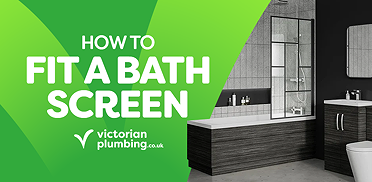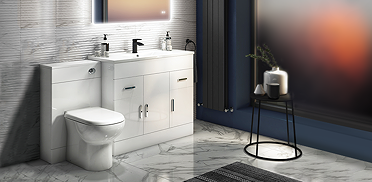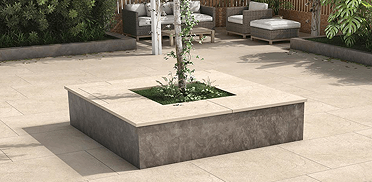Our January Sale Ends Soon. Grab Up To 70% Off While You Can!
Free delivery on orders over £499*
Bathroom Tiling: Everything You Need to Know about Costs and Installation
Bathroom Tiling: Everything You Need to Know about Costs and Installation
In this guide, we'll help you estimate how much tiles and tiling will cost when refurbishing your bathroom.
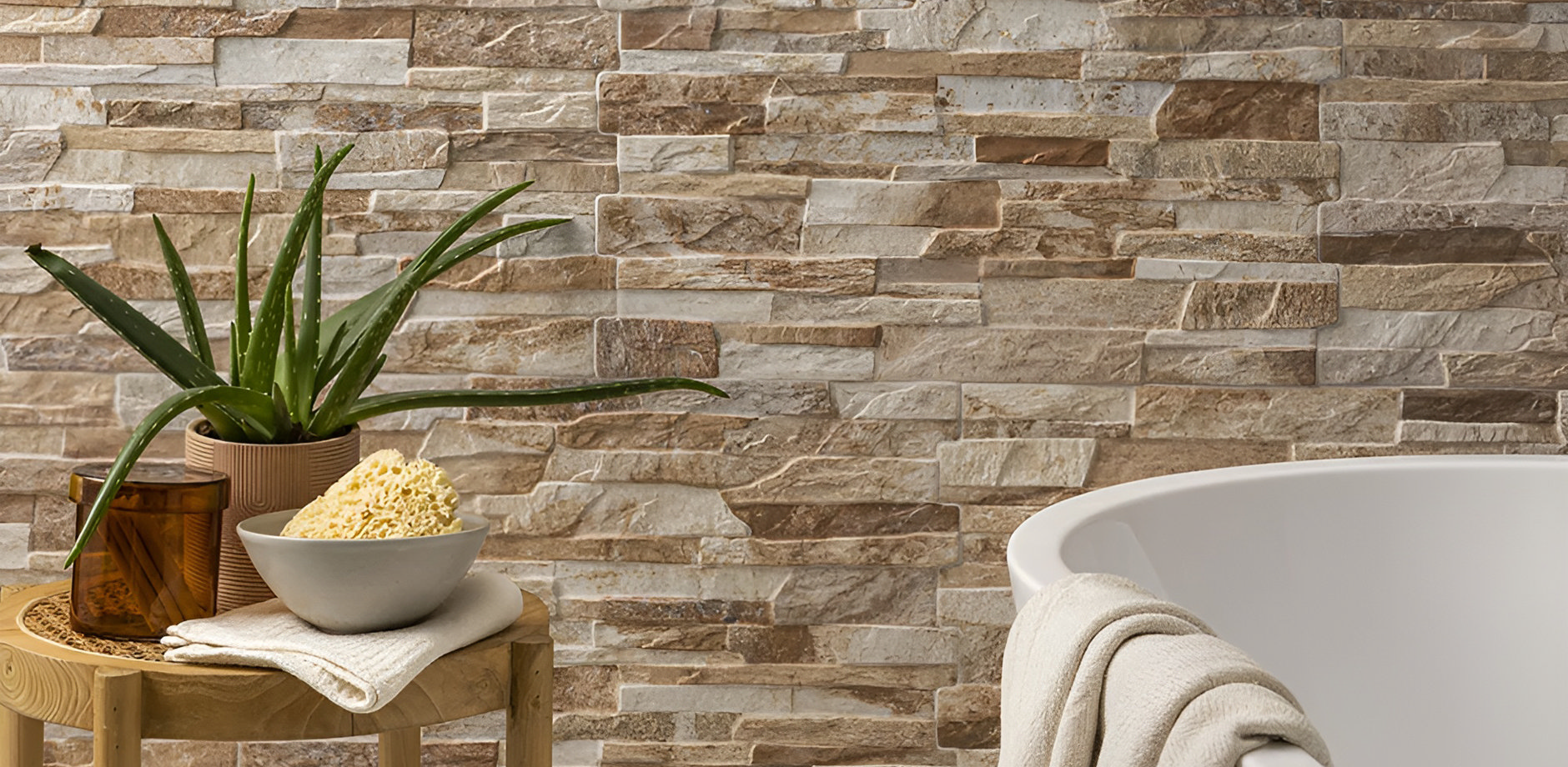
Bathroom tiles come in all shapes and sizes (usually square or rectangular), and the size is usually somewhere between 100cm² and 1000cm². If you want V-shaped or extra-large tiles, more power to you. Whatever you choose, the trick is knowing how to install bathroom tiles and how much they will cost you.
Our guide covers everything you need to know about the cost of installing wall and floor tiles in your bathroom. We'll discuss the best materials, from gorgeous natural stone tiles to affordable ceramic tiles. We'll explain the advantages and disadvantages of DIY bathroom tiling versus hiring a professional to do the work for you. Finally, we'll cover some cost-saving tips to ensure that you get the beautiful bathroom you deserve at a price you can afford.
Let's get to work.
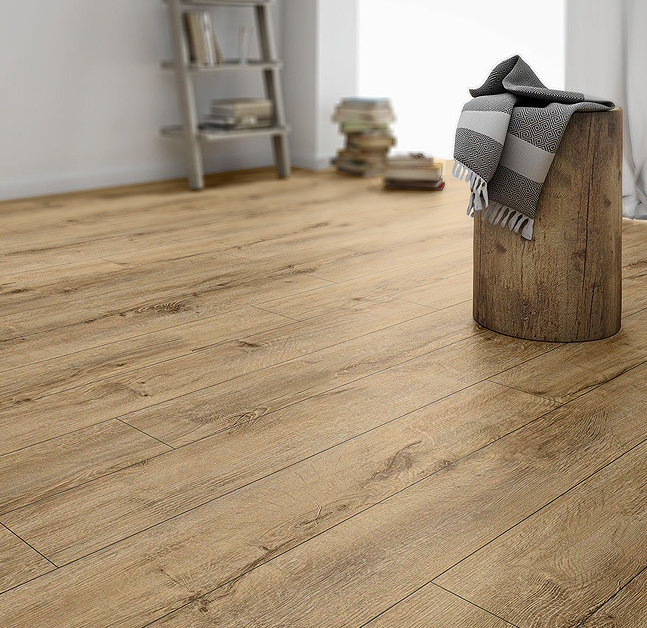
How much does it cost to have a bathroom tiled?
For a medium-sized bathroom, the full cost of tiling will typically run into 4 digits—between £1,000 and £2,500 is fairly standard, including labour costs, the material cost and other features such as grouting. However, this assumes that you're hiring a professional to do the work for you, and so much depends on the materials you choose. The way you source materials also plays a big factor.
Smaller bathrooms can be tiled for less than £500 if you play your cards right and (probably) don't mind a bit of DIY. Larger bathrooms, more expensive tile options and complete renovation projects that include details like installing underfloor heating can run well into the thousands of pounds. For this reason, it's worth assessing what you're working with before you start planning your remodelling project.
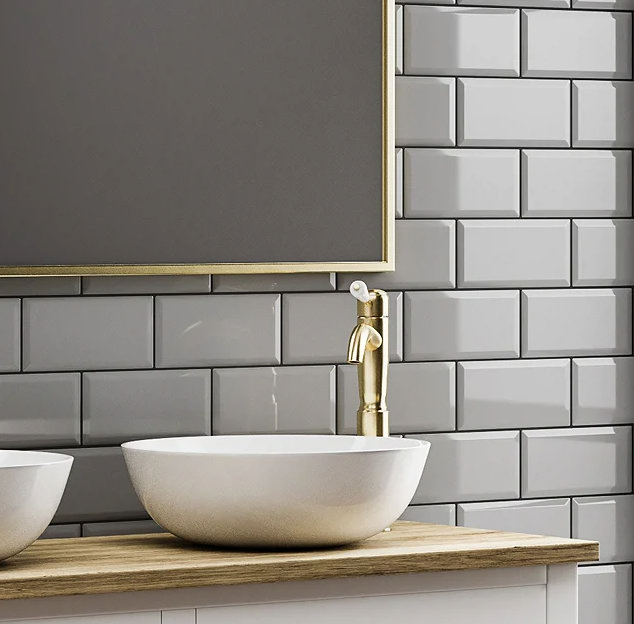
What needs tiling?
Your first consideration is what you're working with. Is it just walls, just floor, or both? While it'll naturally be cheaper to tile just one or the other, you might consider doing both at once if your bathroom needs a makeover. This could save you money on labour costs compared to hiring the same person to do two jobs separately.
Likewise, if you're doing it yourself, you'll likely save time and inconvenience by undertaking one large project. This is more efficient than, for example, just renovating the walls and then deciding to swap the floor out a year later. As far as the rest of your family is concerned, the more frequently you put the bathroom out of service, the more of an inconvenience the projects are.
How many tiles you'll need depends on how high and wide you want to go with the walls. This is usually pretty easy to decide on a practical basin—any area where water from the shower will run or is likely to splash should be protected by tiles. It's up to you whether you want to leave a section of the wall protected with water-resistant paint or cover the entire wall.
You may also wish to install tiles above the sink, as this is another area where frequent splashing can damage painted walls. Much of this is a personal choice, but the greater the area you cover, the more expensive it will be.
Size of the bathroom
The cost to tile a bathroom varies dramatically depending on its size. A small bathroom might cost around £500–£1,000 for the entire bathroom. Meanwhile, a large bathroom will rarely cost less than £2,000, and can easily cost over £5,000 if you choose to install expensive materials like glass or slate.
If you're hiring a professional to do the work, they'll measure up your bathroom and offer a quote on that basis. It's always a good idea to measure your bathroom independently so you can query their figures if necessary. There might be some minor discrepancies in measurements, but your figures should roughly match, and the tiler should be able to explain their costs in full.
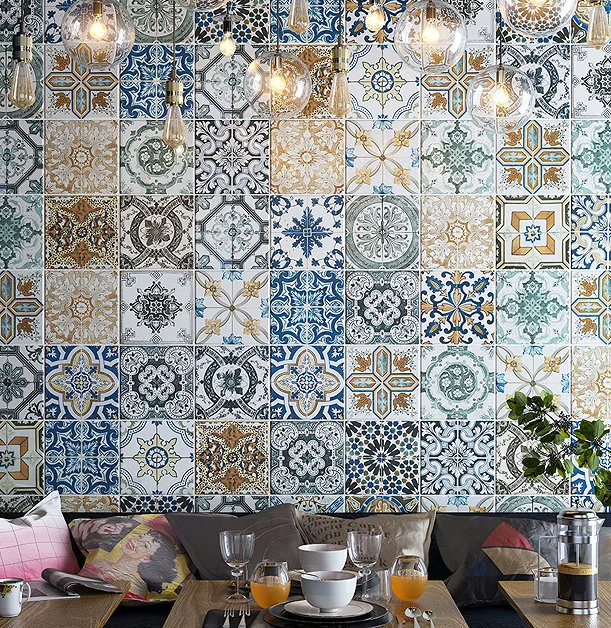
Cost of materials
Regardless of bathroom size, perhaps the biggest variable is the material cost to tile your bathroom. Tile materials are either measured by the square metre or by the unit.
At the lowest end of the scale, ceramic tile might cost as little as £15 per square metre. At the upper end, glass and slate can cost around 10 times that, with the most expensive options weighing in at a cool £150 per square metre.
Okay, we see you raising a tentative hand—did we say that glass could cost up to £150 per square metre? We sure did! This glass has been treated to make it incredibly durable, is super-easy to clean and can be colour-customised in a way no other material can. It's one of the most popular materials for mosaic designs (which look fantastic but command a high price tag).
Rest assured that glass doesn't always cost that much, but it's incredibly versatile for creative bathroom designs. With great versatility comes great potential expense.
It’s also worth noting the material costs will depend on who's buying. A good Tradesperson might get you a Trade discount by sourcing the materials for you. You might also get a discount if you hire a professional who works with a retailer. It's worth getting a quote, at least—but compare the quote with the cost of buying the materials yourself. Sometimes it's cheaper if you buy them, but it simply depends on the situation.
Labour costs
The next thing to consider is whether you want to undertake a DIY project or hire a professional tiler to remodel your bathroom. You'll typically pay £100-250 for the labour cost of hiring a professional, depending on the size of the bathroom.
A great way to save money is by hiring a tiler who works with a manufacturer or retailer. This focuses all the costs of your bathroom tiling project in one place and can lead to significant reductions compared to sourcing your materials and paying for labour independently.
As with any major home improvement project, getting multiple quotes for a tiling job is highly recommended. Check out your local and reliable Tradespeople and determine if they work with specific retailers or manufacturers. You should also obtain a quote from the place you're buying your materials if they offer an installation service.
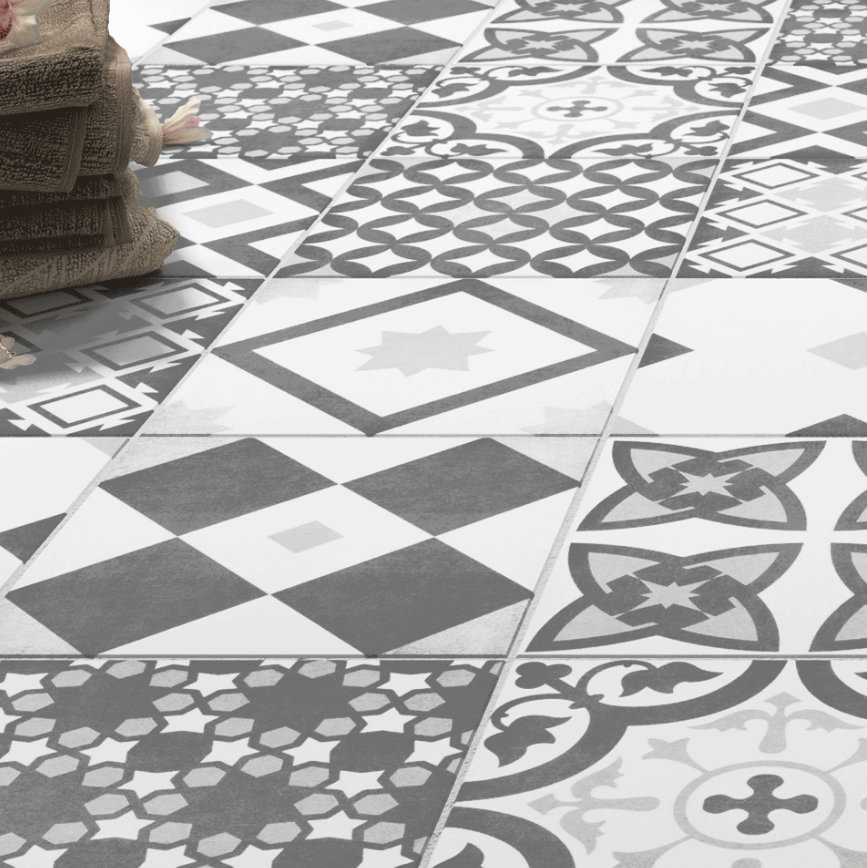
Cost of tools
This specifically applies to DIY projects. If you're going to tile a bathroom by yourself, you will need:
- Protective sheeting for all work areas (especially if you're re-doing the walls)
- PPE (goggles, gloves, work boots)
- Tile cutter
- Tile nipper
- Tile adhesive
- Grout
- Silicone
If you don't own any of this equipment and don't know if you'll use it much beyond this project, stop and think. You could easily set yourself back over £100 for all this equipment, especially the boots! And yes, you should wear protective footwear for this type of project. Falling tiles are heavy, sharp, and yes—it's easy to drop them. This is what makes this sort of injury so common, even for professionals.
Unless you're looking forward to the DIY simply because you love a good project, bathroom tiling prices from a Tradesperson might even be lower than the cost of buying tools and PPE to apply your own tiles.
Besides this, there's the time investment—a professional might get a small bathroom done in a day. A medium-sized bathroom might take 2-3 days, while a large project might take slightly longer. But that's the time someone else is putting into it—not you. If you'd love to spend your week off tiling, that's great! Otherwise, a professional can get the job done while you're at work with minimal inconvenience.
Tearing out old tiles
A great way to save yourself a bit of money is to tear out old tiles by yourself. This is comparatively easy, although you should still wear PPE and protect your bathtub, etc.
This is one of the most easily avoidable tile fitting costs and can expose problems like uneven walls or deep water damage. Knowing about these issues before you obtain a quote from a Trade professional is always the best way to ensure you get an accurate quote and timeframe.
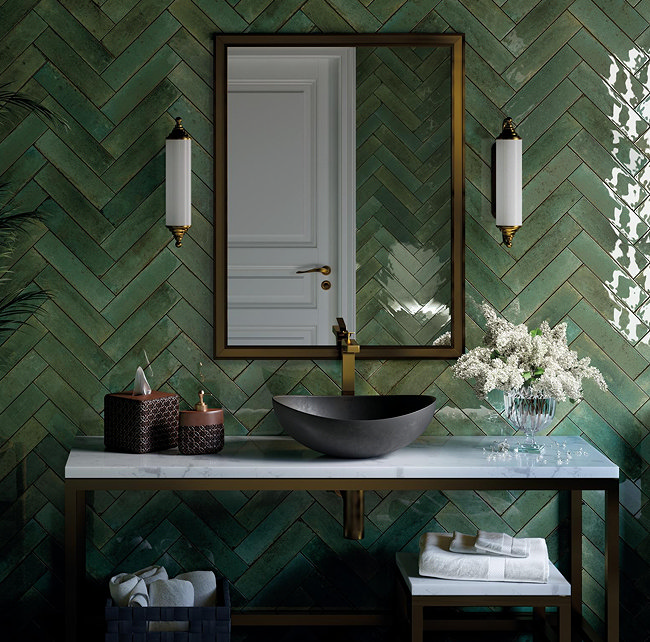
Best materials for tiling a bathroom
The average material cost for a fully-tiled bathroom varies, as discussed above. Here's a rough breakdown of tile cost per material and the advantages of different types of bathroom tiles.
Ceramic tiles
Cheap, cheerful and easy to install—ceramic is appropriate for all areas of your bathroom. Whether it's a ceramic tile floor or ceramic tiles on the walls, this material cleans easily, looks nice and is the most affordable material of all.
It's a great choice for DIY projects—spare tiles left over because of inaccurate estimates won't create huge additional costs.
A disadvantage of ceramic for flooring is that it shatters more easily than some materials—broken tiles are unattractive and can be dangerous. Larger tiles are also more susceptible to cracks.
Porcelain tiles
Porcelain tiles are the high-end version of ceramic. These manmade tiles have a distinctive sheen and a much more delicate appearance, and they're a popular choice for bathrooms of all sizes.
Porcelain tiles are significantly more expensive, which can feel risky as they're somewhat prone to cracks. For this reason, porcelain is preferable for wall tiles compared to flooring.
Marble tiles
Marble tile is a popular choice because of its natural beauty and relatively low tiling costs. Marble typically costs between £30-60 per square metre and is a great choice for your bathroom floor because it's more durable than porcelain or ceramic.
Terracotta tiles
Terracotta is a great choice if you're planning to lay tiles yourself because it's one of the cheapest materials out there. It also gives your bathroom a rustic look that complements the DIY tiling process.
Terracotta is more suitable for the floor than the walls as it's naturally porous. It needs to be thoroughly sealed if you're using it for bathroom walls.
Vinyl tiles
Vinyl flooring is an affordable and low-maintenance choice for the bathroom. Again, it's more appropriate for the floor than the walls—if left soaking for a long time, vinyl can warp and deform.
Granite tiles
Granite is a natural stone option that looks amazing in bathrooms. It's suitable for floors and walls, although it needs to be carefully installed if used for walls as it's extremely heavy.
Tiling costs for granite are fairly high. Quality tiles made of this material might set you back £70-£100 per square metre. However, it's incredibly durable—you won't encounter a loose tile on your floor for many years if you choose granite.
Travertine tiles
Limestone and travertine effect tiles are great for a more affordable stone option. They work well with underfloor heating and new tiles made of limestone or travertine might cost £45-£85.
Glass tiles
The cost of tiling for glass tends to run fairly high (£90-£150). The installation cost is high because working with glass is delicate and there are so many customisation options, and are considered a desirable, luxury material.
Patterned tiles
Many "feature tiles" are adorned with pretty patterns. These can be applied to many materials, but they will generally increase the cost of tiling your bathroom.
Mosaic tiles
If you're interested in a unique tile layout, you might consider a mosaic pattern. The cost to tile a bathroom in this way is quite high, as it requires more tiles and careful arrangements of smaller tiles. Unless you're an experienced DIYer, you should probably hire a professional if you want to fully tile your bathroom in a mosaic pattern.
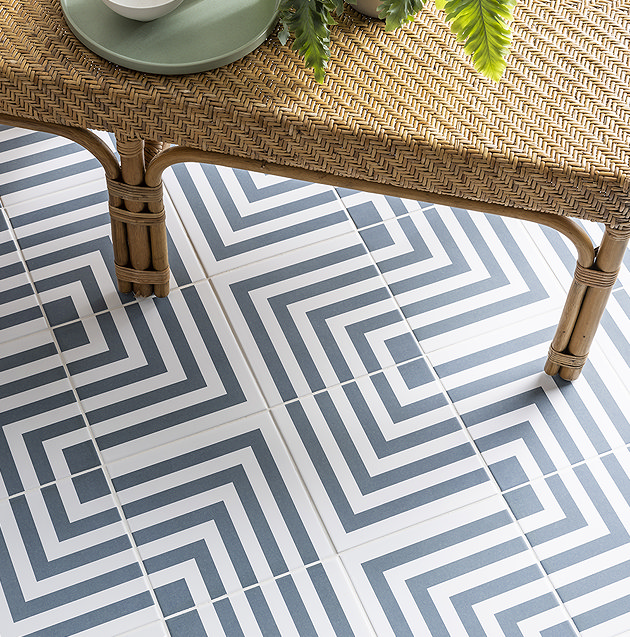
Should you hire a professional tiler or do it yourself?
DIY seems a tempting option when you're considering how much does it cost to tile a bathroom. However, unlike some home renovation projects, it's not as clear-cut as "DIY is cheaper".
How much do tilers charge per hour in the UK?
Professional tilers will typically charge £20-£40 per hour, although you may be able to arrange a fixed cost per day for some projects.
The price depends on your location—people living in northern England can expect far lower costs than people living in central London. A few home practical skills can save you a lot of money if you live in the southeast.
Can you install bathroom tiles by yourself?
Yes—but this won't necessarily reduce the cost of tiling.
Weigh up the amount you'd have to spend on PPE, tools and other materials and also the time you'd spend on the project. Is it worth it compared to hiring a professional?
Hiring a specialist also solves questions like how many tiles you'll need. It also means you can arrange extra work that needs the attention of a trained professional, e.g. replacing your existing bathroom radiator with a heated towel rail. It's a good idea to get all your bathroom upgrades done at once.
Installing floor tiles vs. tiling bathroom walls
Floor tiles are typically larger than the type of bathroom tile used for walls. Many people also choose to install border tiles for walls, which create a gorgeous appearance but often cost more per unit. For this reason, the floor is often cheaper per square metre than the walls.
Remodelling a floor by yourself is also easier simply because it's flat. It's easier to get neat grout lines and apply pre-mixed adhesive on a flat surface than when treating the walls.
How to save money when tiling a bathroom
If you're concerned about the cost, here are some top tips to save a few pounds here and there.
Buy the materials separately
You may find that you can get a better price than the tiler's quote by purchasing materials yourself. You should still double-check with your tiler to ensure they're happy to install those materials.
Ask around
Check with friends and family—does anyone have a discount with a retailer? Does anyone know a particularly good Tradesperson? Make use of your connections.
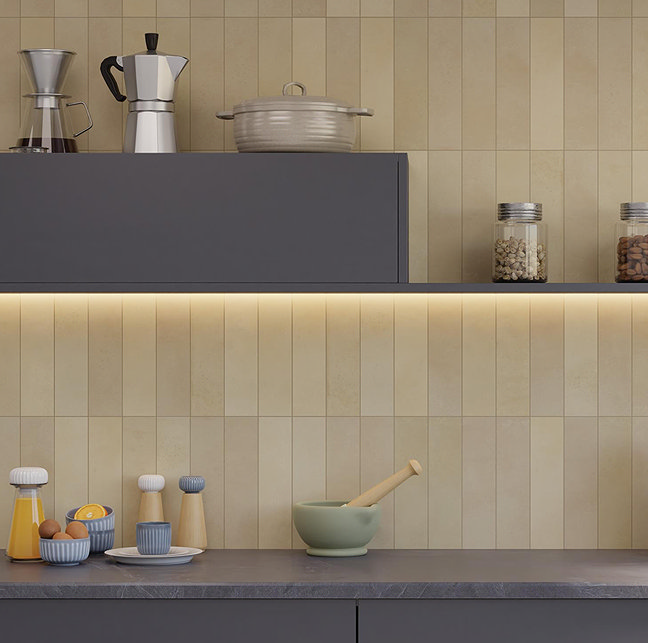
Tear out existing tiles by yourself
This process is pretty straightforward. All you need is:
- A hammer
- A chisel
- Protective gear, including goggles & footwear
- Something to protect your bath
If it saves your Tradesperson some work and saves you some money, what's not to like? Check out our guide to removing tiles.
Look for offers
Major retailers often run discounts on certain materials. Keep an eye out for special offers if you've got a particular type of remodelling project in mind.
When should you start budgeting to re-tile a bathroom?
So how much does it cost to put tiles in bathroom wall? And when should you start saving?
The overall cost is around:
- Small bathroom: £500-£1,200
- Medium bathroom: £1,000-£3,000
- Large bathroom: £2,000-£5,000+
The time to start saving is now! This project is a significant investment, and you'll have to look at it for years to come. It's worth saving up for a high quality upgrade.
Final thoughts
If you're planning a bathroom renovation project, the first thing you should do is set up a spreadsheet to work out your costs. Boring? Yes. Effective? Definitely. That's the golden rule of 99% of DIY projects—if it feels boring and like you're doing the right thing, keep doing it.
Whether you hire a Tradesperson or take on the project yourself, it's so important that you now understand the costs and installation process of tiling a bathroom. And when it's all done, you enjoy your beautiful new space.
Shop tiles
Now you know our top tiling tips, perhaps it’s time to choose the perfect tiles for your bathroom. Click on the link to browse the full and comprehensive range of quality wall and floor tiles available at Victorian Plumbing.

Hannah
Hannah is one of our bathroom bloggers here at Victorian Plumbing. She'll be posting updates on the latest bathroom trends and decorating tips. Look out for her expert 'how to' step-by-step DIY guides too!
